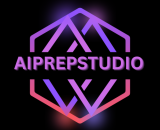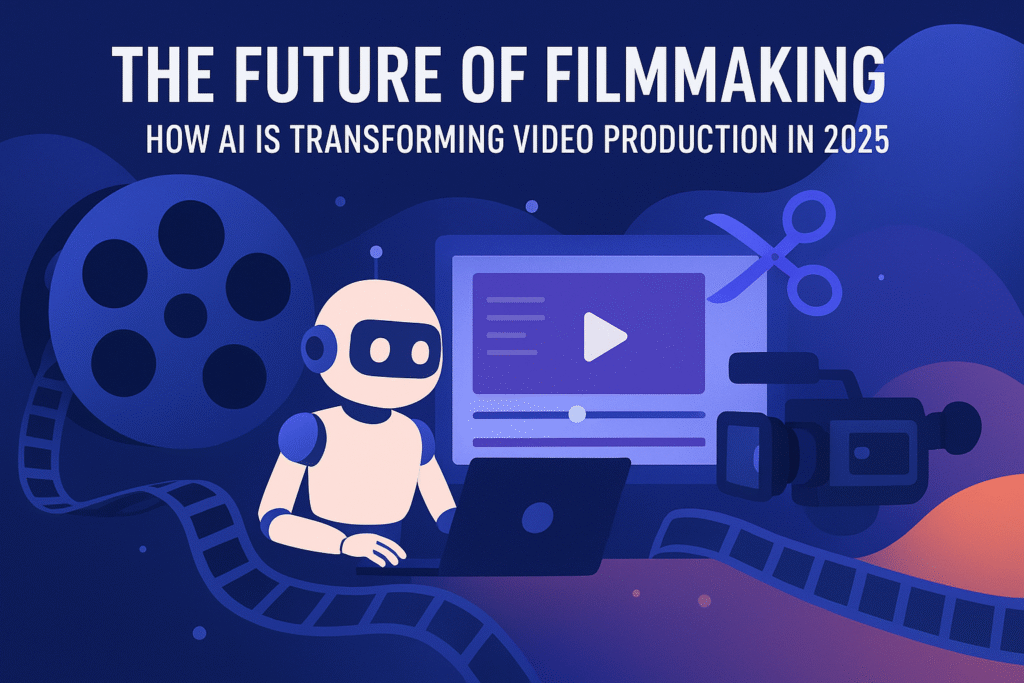Filmmaking has always been about creativity, storytelling, and technology. From the early days of silent films to the modern era of CGI-driven blockbusters, each new innovation has pushed the boundaries of what’s possible on screen. Now, in 2025, Artificial Intelligence (AI) is leading the next revolution in video production — and it’s transforming the industry faster than ever before.
Whether you’re a YouTuber, small business owner, or aspiring filmmaker, AI tools are making professional-quality video creation accessible to everyone. Let’s explore how AI is changing filmmaking in 2025, the tools driving the shift, and how you can use them today.
1. AI-Powered Scriptwriting: Stories at Lightning Speed
One of the hardest parts of filmmaking is writing a script that connects with audiences. AI is now helping creators brainstorm ideas, outline plots, and even generate full scripts.
- ChatGPT (link) – Helps writers brainstorm dialogues, structure story arcs, and refine ideas.
- Jasper AI (link) – Perfect for generating creative storytelling content and ad scripts.
- Sudowrite (link) – An AI co-writer that helps fiction creators develop unique storylines.
👉 This doesn’t replace human creativity but enhances it, letting creators focus on emotional depth and originality while AI handles structure and pacing.
2. AI Storyboarding and Pre-Visualization
Traditionally, storyboarding requires hiring artists or spending hours sketching. In 2025, AI tools can turn a simple text description into detailed visuals.
- Storyboard That (link) – Lets creators build quick storyboards using AI-assisted templates.
- Runway Gen-2 (link) – Can generate video previews from text prompts, helping filmmakers visualize scenes before shooting.
This not only saves time but also reduces production costs by allowing teams to preview what their film will look like before cameras roll.
3. AI in Video Editing: Hollywood-Level Effects for Everyone
Editing is often the most time-consuming part of filmmaking. Now, AI-powered editors are changing that game.
- Runway ML (link) – Offers AI-powered editing, background removal, and video generation.
- Pictory (link) – Turns long-form content into short, engaging videos automatically.
- Adobe Premiere Pro with AI (Sensei) (link) – Automates tasks like scene detection, color correction, and even audio syncing.
AI allows filmmakers to create cinematic effects, seamless cuts, and professional-grade videos in minutes instead of weeks.
4. AI Voiceovers and Dubbing
Voice acting and dubbing often require hiring talent in multiple languages. AI voice tools now provide natural, human-like voices in any accent or tone.
- Murf AI (link) – High-quality voiceovers for narration, ads, and films.
- ElevenLabs (link) – Ultra-realistic AI voice cloning for actors and content creators.
- Resemble AI (link) – Creates custom AI voices for dubbing and branding.
This means independent filmmakers can now localize content globally at a fraction of the cost.
5. AI-Generated Visual Effects (VFX)
Big-budget movies used to dominate with VFX, but AI is making it possible for small creators to add Hollywood-level effects.
- Kaiber AI (link) – Generates animations and visuals from prompts.
- Runway Gen-2 – Creates AI-generated clips for inserting into films.
- Wonder Dynamics (link) – Lets creators animate CGI characters directly into real footage using AI.
This is leveling the playing field, where even indie films can now compete visually with blockbuster productions.
6. Personalized Content for Audiences
In 2025, personalization is everything. AI allows filmmakers and marketers to customize trailers, ads, and even entire scenes for different audiences.
For example:
- A movie trailer could show different scenes depending on whether the viewer is in India, the US, or Japan.
- An ad could change its tone based on the viewer’s interests.
This personalization increases engagement, sales, and fan connection.
7. The Rise of AI Filmmakers
Platforms like YouTube, TikTok, and Instagram are exploding with AI-generated short films. Some creators now produce entire films with little to no traditional filming equipment.
- Solo creators can now write, edit, and publish videos daily using just AI tools.
- Studios are adopting AI workflows to cut costs and speed up production.
- Startups are emerging that specialize in AI-powered film production.
⚖️ The Debate: Will AI Replace Human Filmmakers?
While AI is powerful, it’s unlikely to replace human creativity. Storytelling requires emotion, cultural context, and originality — things AI still can’t fully replicate.
Instead, the future looks collaborative:
- AI will handle technical tasks (editing, effects, voiceovers).
- Humans will bring the soul of storytelling — empathy, emotion, and creativity.
The best films of the future will likely be AI-assisted, not AI-created alone.

